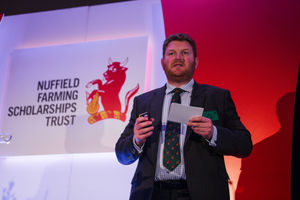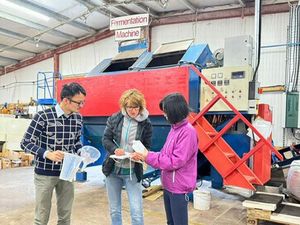Delivering he Farm Fresh Revolution
Robert Mercer is a fourth generation farmer, who with his father Roger and brother Alec, farms arable, chickens and pigs on a significant scale in the Barton Under Needwood, Burton on Trent area from their base Blakenhall Park.

Grandfather Alec Mercer was an arable farmer and famous pedigree Large White pig breeder, whilst Robert’s father Roger turned to intensive indoor and low cost pig production. His brother Alec is famous for his free range Packington Free Range chicken production, leaving Robert since he left Newcastle University in 2002 to develop an outdoor free range pig unit of 8,000 sows.
He produces 600 free range fat pigs a week, and buys weaners from a further 3,000 outdoor sows; marketing 4,500 fat pigs a week reared on 3rd party farms in deep straw yards with low stocking density. They are all sold to butchers, farm shops and selected supermarket supply chains under the Packington Free Range (RSPCA approved) brand.
Keen to seek a Nuffield Scholarship - his father and brother are both Nuffield Scholars - he successfully applied for one to study “how to develop and add value to a pig business whilst contributing to society.” This he did in 2016, and visited 10 countries including China, Brazil, Denmark and the USA. However part way through with permission of his sponsors The Worshipful Company of Butchers, he changed the emphasis to “what part farmers can play in reducing food poverty in the UK”
Greatly impressed though he was by the production and marketing methods of pig production, in Denmark in particular, he felt that already running at home a highly successful business, a greater need for study is the role of farmers in helping alleviate the nutritional needs of the poorest in society. This is particularly in terms of fresh fruit, vegetables, and meat, so as to lift the beneficial nutrient, mineral and vitamin content of the mainly highly processed food many of those on low incomes rely on, because it is cheaper and readily available. Ten percent of UK families have an income of less than £9,644 a year. Their purchases of fresh fruit, veg and meat in recent years has fallen by 25 per cent whilst prices have risen by 30 per cent.
Rob Mercer was greatly impressed on his study tour by the mobile pantry systems in the United States where a weekly delivery was made to a central point where people could come to the lorry and pick up fresh produce. This is a model he has followed in his own Farm Fresh Revolution which he began in January 2017.
Currently he delivers fortnightly on a Friday afternoon at school coming out time, to six Staffordshire primary schools (three each week)where a high percentage of families have an income of less than £12,000 a year. Using his own refrigerated transport his volunteers open a market stall offering packs of 8 free range sausages, 480 grams of diced free range chicken, six free range eggs, 2kg of potatoes, four apples and bananas, and an iceberg lettuce. Parents choose the individual items themselves to the value of about a £6 cost to Rob Mercer, worth nearly £17 at shop prices. Typically 45 bags are given out at each school, with an overall cost to him including overheads of about £7.50 each. The number of schools visited will soon be increased to 10.
Choosing their own items rather than offered a filled bag of ingredients from the volunteers, has created much more discussion and interaction with the teachers and parents, he said. Recipe leaflets from the Childrens Food Trust are handed out alongside a newsletter. Most important, said Rob, is to put the emphasis on farmers promoting fresh produce of excellent quality, not a charity giving away food.
Back at the farm Rob and his equally enthusiastic to the project ,wife Sally, host school visits in the summer and early autumn terms. Over three years they have hosted 92 schools and more than 13,000 school children. In the winter months they organize talks to schools about where food comes from and healthy eating.
Not every farmer is able or willing to promote fresh produce and help reduce food poverty to this extent, but he believes independently owned businesses, like farms, need to take a leading role by running their businesses for social benefit as well as wealth creation.
Many farmers could perhaps once a year hold an afternoon at their local primary school offering fresh produce like potatoes, alongside fresh meat from their local butchers, and items from local growers. Helping to bridge the gap that exists between farmers and the public and the importance and value of fresh home produced food. Perhaps we need a national Fresh Produce Day, he says.




